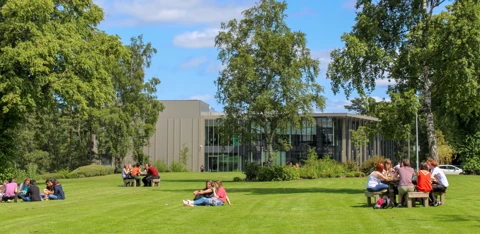Key information
Gain foundational knowledge in engineering and get prepared for degree level studies. This is an alternative route where after your first year you will progress onto second-year study of an undergraduate degree.
- UCAS code
- GC23
- Level
- Undergraduate
- Delivery type
- Full Time
- Degree qualification
- BSc (Hons)
- Mode of delivery
- On-Campus
- Duration
- 4 years
- Location
- Edinburgh
- Start date
- September, January
The Engineering Bachelors Accelerator is an alternative route to begin your degree offering direct entry to second-year study across our undergraduate degrees. It provides you with foundational knowledge in engineering, where you can choose your courses depending on your specific interests and career aspirations.
Towards the end of your first year, you will have the opportunity to work closely with your academics to identify which undergraduate degree programme you will progress onto in second year. It can be overwhelming choosing a degree before starting university, so this approach means that you can make your decision based on your learning.
Degree pathways
Successful completion of this programme offers a direct pathway to a wide range of professionally relevant degrees:
- Architectural Engineering, BEng (Hons)
- Architectural Engineering, MEng
- Chemical Engineering, BEng (Hons)
- Chemical Engineering, MEng
- Civil Engineering, BEng (Hons)
- Civil Engineering, MEng
- Combined Studies, BSc (Hons)
- Electrical and Electronic Engineering, BEng (Hons)
- Electrical and Electronic Engineering, MEng
- Construction Project Management, BSc (Hons)
- Geography, Society and Environment, MA (Hons)
- Mechanical Engineering, BEng (Hons)
- Mechanical Engineering, MEng
- Mechanical Engineering and Energy Engineering, BEng (Hons)
- Mechanical Engineering and Energy Engineering, MEng
- Robotics, Autonomous and Interactive Systems, BEng (Hons)
- Robotics, Autonomous and Interactive Systems, MEng
- Quantity Surveying, BSc (Hons)
- Structural Engineering, BEng (Hons)
- Structural Engineering, MEng
Your student experience
Get prepared for degree level studies with lectures, tutorials, and seminars, encouraging independent thinking and developing your academic knowledge and skills.
The intensive and focused programme will enable you to:
- transition seamlessly into degree-level studies;
- make an informed choice about your degree;
- develop independent learning skills through our problem-based and student-centric learning approaches;
- learn to work in groups, conduct research and deliver presentations.
During your studies, you will gain important practical, hands-on experience in our heavily invested practical labs and facilities. You’ll benefit from and have access to our well-equipped labs and facilities in GRID, with state-of-the-art, specialist equipment and software and be supported throughout by friendly and helpful staff, to ensure you reap the benefits of practical work.
The hands-on approach means you’ll apply your theoretical knowledge to practical experiments, and gain experience in using industrial-grade equipment, which you can use to benefit your studies, inform, and develop your academic assignments, and use for extra-curriculum and personal projects.
Outside of the classroom, you have the opportunity to join a variety of societies to meet likeminded people, get involved in regular social and networking events, and gain insights into career prospects. Engineering subject relevant societies include:
Go Global
With Go Global, Heriot-Watt's global student programme, you can carry your studies to new places and experience new cultures, expanding your horizons on the way. You'll discover what it means to be a true global citizen and emerge prepared for wherever your career journey will take you.
Inter-Campus Transfer: Dubai
Inter-Campus Transfer: Malaysia
Course content
September intake - Edinburgh
In first year, you will take four year-long courses of 30 credits each.
Optional AY
- Mathematics
- Chemistry
- Computing
- Physics
- Academic Skills
- Academic English and Study Skills
January intake - Edinburgh
In first year, you will take four year-long courses of 30 credits each.
Optional AY
- Chemistry
- Computing
- Physics
- Mathematics
- Academic Skills
- Academic English and Study Skills
May intake - Edinburgh
In first year, you will take four year-long courses of 30 credits each.
Optional AY
- Chemistry
- Computing
- Physics
- Mathematics
- Academic Skills
- Academic English and Study Skills
Fees and funding
| Status | Full Time |
|---|---|
| England / Wales / N Ireland | £9,535 |
| International | £19,456 |
- Status: Your residency status is usually defined as the country where you have been ordinarily resident for the three years before the start of your course.
- International: 'International' includes applicants from European Union countries who do not hold Pre-Settled or Settled status in UK. (This does not include students from the Republic of Ireland - see above).
Scholarships and bursaries
Travel Home Bursary
Available for students from England, Wales or Northern Ireland.
We appreciate that moving away from home for the first time can be daunting. Our Travel Home Bursary should allow you to return home at several points throughout the academic year. The Travel Bursary applies to your first year of study only.
Entry requirements
We have standard entry requirements for all of our courses that you will have to meet.
Academic entry requirements
- Highers CCD including a science or maths + National 5 Maths & English at Grade C
- A-Levels DEE/CD including a science or maths. GCSE English and Maths at C/4
- International Baccalaureate 26 points including H5 + H4 OR H4+H4+H3. Science / maths subject is required at H4. S4 at Maths & English
- BTEC Extended Diploma Not accepted
International academic entry requirements
- Bangladesh - Higher Secondary Certificate - grade average of 65%
- China - Senior High 2 - average grade of 70% or Senior High 3 at an average of 65%
- Ghana - West African School Certificate (WAEC) - or Senior School Certificate in four subjects with grades 1-6 (A-C)
- Hong Kong - Form 5 in four academic subjects (grades will be assessed on a case by case basis) or HKDSE with grades 223 in relevant subjects
- India - Standard 10 + 1 - 70% or Standard 10 + 2 at 55%
- Indonesia - SMU 2 - Grade 7.0 or SMU 3 Grade 6.5 (five relevant subjects required)
- Iran - High School Diploma (3 years) - average grade of at least 14 (in relevant subjects)
- Jordan - Tawjihi - 80% in 4 relevant subjects
- Kazakhstan - ATTESTAT/Certificate of Secondary Education - grade average of 4
- Kuwait - Shahadat-al-thanawia-al-a'ama - passmark of 80% in relevant subjects
- Libya - Secondary Education Certificate - average of 80%
- Malaysia - Form 5. Ter, 2 or Mid-Year Transcript - A-C in five relevant subjects
- Nigeria - WAEC or SSC - grades 1-6 in four relevant subjects.
- Pakistan - High Secondary Certificate - four passes in relevant subjects with an average of 55%
- Qatar - Thanawaya Aam Qatari - average grade 80% in relevant subjects
- Saudi Arabia - Tawjihi - average of 80% in relevant subjects
- Thailand - MAW5 - GPA of 2.5 or of MAW 6 with a GPA of 2.0 in six relevant subjects
- United Arab Emirates - Tawjihi - 80% or above in relevant subjects
- Ukraine - ATTESTAT/11th Grade Certificate of Secondary Education - grade average of 7.0
- Vietnam - Completion of Year 12 at Secondary School with average grade of 7.0
Why Heriot-Watt
We're the top university in Scotland for graduate outcomes which means that more of our graduates are employed or in postgraduate education than any other institution in the country and we ranked 5th in the UK.
We're also rated number one in the UK for CEO or MD roles, meaning more of our graduates go on to become CEOs or MDs than any other university in the whole of the UK. On top of that, we have beautiful campuses, across the globe, so you'll get a truly international education. Our Edinburgh Campus is home to Oriam, Scotland's National Sports Performance Centre combined with plenty of wellbeing resources, prioritising fitness and mental health for all students. Our Global Research Institutes look at solving real world issues such as climate change and saving our oceans as well as working on the next medical technological breakthrough and the future of AI and robots.
Student life
Explore facilities, and chat to staff and students
Discover Uni course data
Discover Uni provides data on each university's degree courses across a range of measures including student satisfaction, graduate jobs and salaries.





